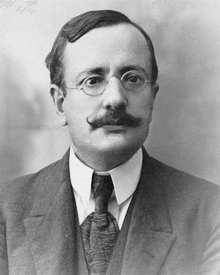Vitorino de Carvalho Guimarães
Vitorino Máximo de Carvalho Guimarães (born November 13, 1876 in Penafiel , † 1957 ) was a Portuguese politician and Prime Minister (Presidente do Conselho de Ministros) during the First Republic .
biography
Studies, professional activities and the fall of the monarchy
After attending school, he graduated from the Porto Institute of Commerce and Industry . After completing the trade exam in 1901, he was admitted to the military school ( Escola do Exército ). Later he worked as a lecturer of Administration and Finance at the Military School, the Military Institute ( Instituto dos Pupilos do Exército ), the Supreme Trade Institute ( Instituto Superior de Comércio ) and finally the Supreme Institute for Economics and Finance ( Instituto Superior de Ciências Económicas e Financeiras ) active.
He began his political career as an advisor to Prime Minister João Franco Ferreira Pinto Castelo Branco . However, he was one of the republican leaders who led to the overthrow of Franco through the revolt of January 28, 1908 and the abolition of the monarchy two years later .
First Republic and First World War
As a member of the military committee, he was instrumental in the proclamation of the First Republic on October 5, 1910. In the following year he became a deputy of the Constituent Assembly ( Congresso Constituinte ), in which he represented the constituency of Bragança . As a staunch supporter of the Republic, he was a member, founded in 1912 Partido Democrático , but also the later of Álvaro de Castro founded paramilitary Association of Young Turks ( Jovem Turquia ).
On June 29, 1915, he was appointed finance minister in his cabinet by José de Castro for the first time , to which he was a member until November 29, 1915. From 16 to 22 December 1915 he was again finance minister in the Castro cabinet and at the same time trade minister . During the First World War he was the administrative director ( Chefe dos serviços administrativos ) of the 2nd Division of the Portuguese Expeditionary Corps ( Corpo Expedicionário Português ).
After the end of the World War, he became a member of the tax reform commissions and the National Overseas Bank ( Banco Nacional Ultramarino ) in 1919 . In the same year he was elected Member of Parliament ( Assembleia da República ), in which he represented the constituency of Moncorvo . The government also appointed him from 1919 to 1920 as a delegate to the Commission for War Repairs. He then became ambassador to the financial conference in Brussels .
On December 16, 1921, Prime Minister Francisco Pinto da Cunha Leal reappointed him as Minister of Finance. He held this office until the end of Cunha Leal on February 7, 1922 and then became a delegate at the War Economics Conference of 1922. On September 14, 1922, however, he was reappointed finance minister and was a member of the government of António Maria there Silva until November 30, 1922. He then worked as the author of the important tax reform law of 1923.
Prime Minister 1925 and the last years of his life
On February 15, 1925, he was finally appointed Prime Minister (Presidente do Conselho de Ministros) by President Manuel Teixeira Gomes himself . However, he only remained in this office until he was replaced by da Silva on July 1, 1925. In his government, he temporarily took over the office of finance minister again.
After the military coup of May 28, 1926, he withdrew completely from political life and returned to the military administration. In 1936 he was retired with the rank of colonel . Most recently, from 1941 to 1943 he was the author of articles on public accounting and its emergence and development in Portugal ( Contabilidade Pública. Sua Origem e Evolução em Portugal ) in the Journal of Public Accounting ( Revista da Contabilidade Pública ).
His only daughter, the lawyer and women's rights activist Elina Júlia Chaves Pereira Guimarães , had been married to the future first Prime Minister of the Third Republic , Adelino da Palma Carlos , since 1928 .
Web links
- José Adelino Maltez: Políticos Portugueses da Ditadura Nacional e do Estado Novo (1926–1974) . December 20, 2003; accessed on July 11, 2015 (Portuguese)
Individual evidence
| predecessor | Office | successor |
|---|---|---|
| José Domingues dos Santos |
Prime Minister of Portugal February 15, 1925 - July 1, 1925 |
Antonio Maria da Silva |
| personal data | |
|---|---|
| SURNAME | Guimarães, Vitorino de Carvalho |
| ALTERNATIVE NAMES | Guimarães, Vitorino Máximo de Carvalho (full name) |
| BRIEF DESCRIPTION | Portuguese politician, Prime Minister of Portugal |
| DATE OF BIRTH | November 13, 1876 |
| PLACE OF BIRTH | Penafiel |
| DATE OF DEATH | 1957 |
